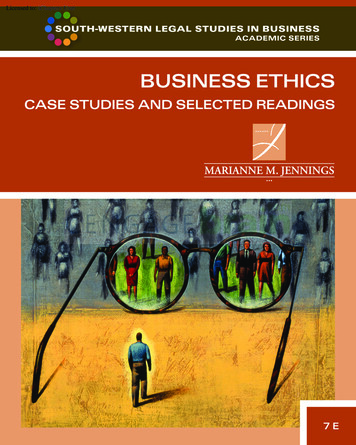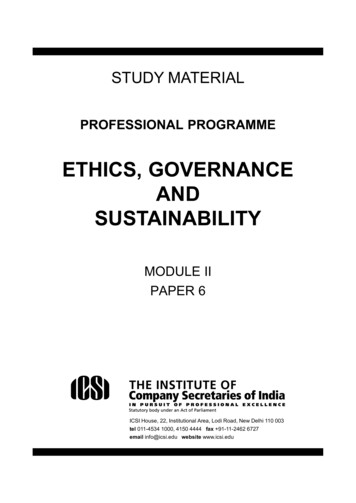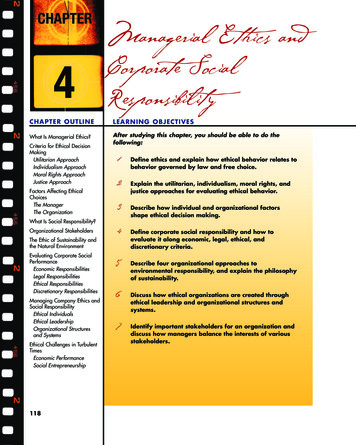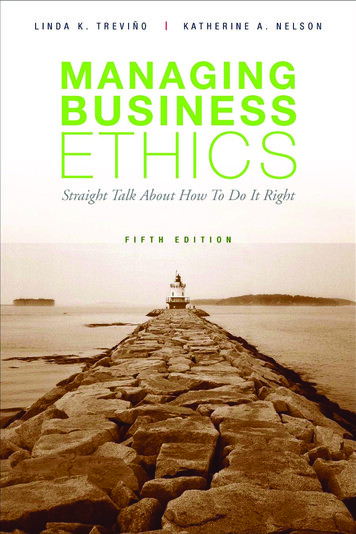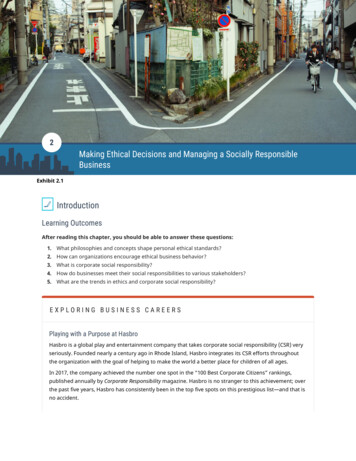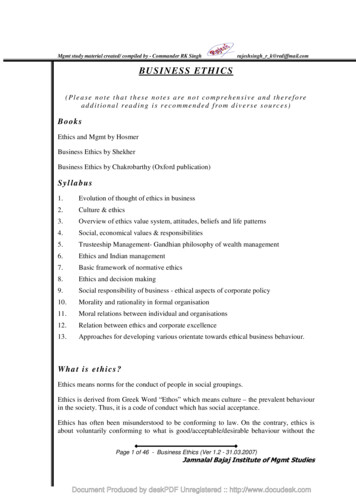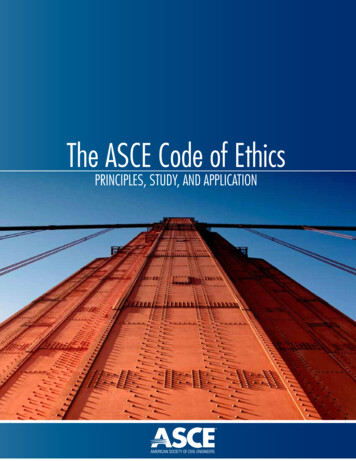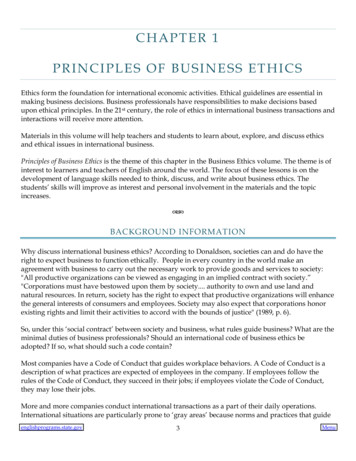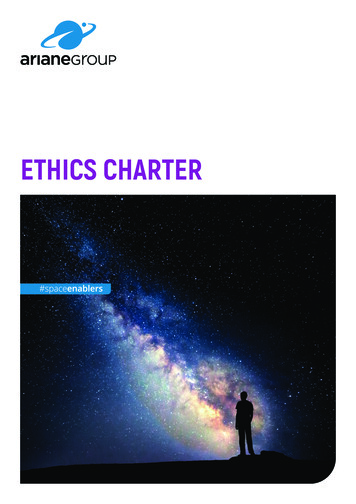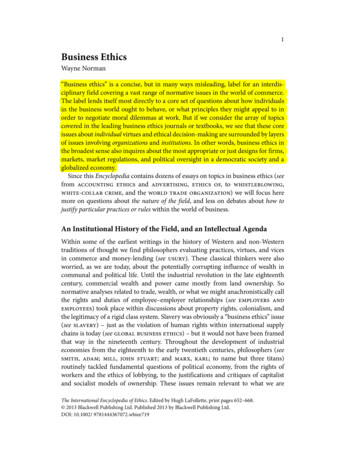
Transcription
1Business EthicsWayne Norman“Business ethics” is a concise, but in many ways misleading, label for an interdisciplinary field covering a vast range of normative issues in the world of commerce.The label lends itself most directly to a core set of questions about how individualsin the business world ought to behave, or what principles they might appeal to inorder to negotiate moral dilemmas at work. But if we consider the array of topicscovered in the leading business ethics journals or textbooks, we see that these coreissues about individual virtues and ethical decision-making are surrounded by layersof issues involving organizations and institutions. In other words, business ethics inthe broadest sense also inquires about the most appropriate or just designs for firms,markets, market regulations, and political oversight in a democratic society and aglobalized economy.Since this Encyclopedia contains dozens of essays on topics in business ethics (seefrom accounting ethics and advertising, ethics of, to whistleblowing,white-collar crime, and the world trade organization) we will focus heremore on questions about the nature of the field, and less on debates about how tojustify particular practices or rules within the world of business.An Institutional History of the Field, and an Intellectual AgendaWithin some of the earliest writings in the history of Western and non-Westerntraditions of thought we find philosophers evaluating practices, virtues, and vicesin commerce and money-lending (see usury). These classical thinkers were alsoworried, as we are today, about the potentially corrupting influence of wealth incommunal and political life. Until the industrial revolution in the late eighteenthcentury, commercial wealth and power came mostly from land ownership. Sonormative analyses related to trade, wealth, or what we might anachronistically callthe rights and duties of employee–employer relationships (see employers andemployees) took place within discussions about property rights, colonialism, andthe legitimacy of a rigid class system. Slavery was obviously a “business ethics” issue(see slavery) – just as the violation of human rights within international supplychains is today (see global business ethics) – but it would not have been framedthat way in the nineteenth century. Throughout the development of industrialeconomies from the eighteenth to the early twentieth centuries, philosophers (seesmith, adam; mill, john stuart; and marx, karl; to name but three titans)routinely tackled fundamental questions of political economy, from the rights ofworkers and the ethics of lobbying, to the justifications and critiques of capitalistand socialist models of ownership. These issues remain relevant to what we areThe International Encyclopedia of Ethics. Edited by Hugh LaFollette, print pages 652–668. 2013 Blackwell Publishing Ltd. Published 2013 by Blackwell Publishing Ltd.DOI: 10.1002/ 9781444367072.wbiee719
2calling “business ethics in the broadest sense” today, even if most scholars of businessethics could be said to assume as a starting point the basic legitimacy of privatesector markets for goods, services, labor, and capital, along with the legitimacy ofgovernment regulation of such markets.Although American business schools in the early twentieth century did in factteach business ethics (Abend 2011), we cannot really identify a scholarly communityof self-described business ethicists until the 1970s or 1980s. The massive Encyclopediaof Philosophy edited by Paul Edwards, which was the standard reference work inphilosophy for two decades after its publication in 1967, had neither an article noreven an index entry on business ethics. By the mid twentieth century, politicalphilosophers were paying much less attention to political economy and focusedalmost exclusively on issues of justice in public-sector rather than private-sectorinstitutions. Or to put it another way, they were much more preoccupied with thejustice of redistributing wealth than they were with issues of justice arising in the creation of wealth (e.g., Rawls 1971; see rawls, john). Meanwhile the number and size ofbusiness schools grew rapidly in the last decades of the twentieth century, and theywere well positioned to respond to demands, often after major business scandals, foruniversities to “teach ethics” to future corporate leaders. In many cases the firstprofessors of business ethics in business schools in this era were established moralphilosophers like Tom Beauchamp, Norman Bowie, George Brenkert, John Boatright,and Patricia Werhane. And their names are still to be found on the spines of the mostwidely used business ethics textbooks, some now in their seventh edition or beyond,having all been originally published after 1979. It is noteworthy that several recenttextbooks by a younger generation of scholars are framed by normative concepts likecorporate social responsibility, sustainability, corporate citizenship, the so-called triplebottom line, or stakeholder management. These concepts were coined not by moralphilosophers, but by consultants, activists, or corporate public-relations departments(see corporate social responsibility; sustainability; stakeholder theory).The leading scholarly organizations – the Society for Business Ethics and theAssociation for Practical and Professional Ethics in the US, and the European BusinessEthics Network – were established in 1980, 1991, and 1987, respectively. The Journalof Business Ethics began in 1982 publishing semi-annual issues. In 2010 it publishedseven volumes (volumes 91 to 97) and 39 separate issues, each containing severalarticles. Other leading journals also date from this period, with Business EthicsQuarterly appearing in 1991, and Business Ethics: A European Review in 1992.Reflecting on the contingent institutional history of business ethics invites us tothink about how we might more ideally map out and connect its issues if freed fromthe pressing pedagogical needs of professional schools. There is, of course, nouncontroversial way of mapping out and linking the issues of any branch of ethics orpolitical philosophy. Different traditions will do this in different ways. Deontologicaland consequentialist political philosophers, for example, disagree about whether thetheory of the right or the theory of the good has priority; and virtue ethicists rejectthe priority of either of these types of abstract principles (see deontology;consequentialism; virtue ethics). If it makes sense to think of business ethics as
3a distinct field, then we want to pay special attention to the ways norms in the worldof business are, or ought to be, different from those in other realms. A strong casecould be made that “business ethics in the broadest sense” should include and makesense of the following four features:1 There should be discussions of issues and principles (theories, virtues, etc.) atthree general “levels”:(a) A “micro-level” concerning the behavior of individuals working within orinteracting with businesses. What rights and obligations do they have, whatkinds of actions are permissible, what virtues and character traits shouldthey cultivate, how should they resolve dilemmas, and so on?(b) A “mid-level” concerning the activities, policies, and governance structuresof organizations like firms, non-governmental organizations (NGOs),professional associations, industry associations, and regulatory agencies.How do we evaluate the activities of these entities? What rights, obligations,responsibilities, and permissions do they have? What internal structures,hierarchies, chains of authority, rules, cultures, and so on, are appropriatefor such organizations; and how might they legitimately structure theobligations, rights, characters, and identities of the individuals workingwithin or interacting with them?(c) A “macro-level” concerning the structure of markets and their regulationwithin a democratic state and an international economy. How are freemarkets for goods, services, labor, capital, and externalities (like carbon)justified, and what justifies their regulation? Who has authority to regulatethese markets (domestically and internationally), and what principles,standards, and procedures are appropriate for designing and enforcingregulation? What roles are appropriate for businesses and their stakeholdersin political and regulatory processes?2 Comprehensive discussion of issues at each of these levels must be closely linked tothose at the other levels. It will be difficult to judge what individuals ought to doacross a broad range of situations in business without taking into account thenature of the organizations they are engaging with; and the rules and normswithin organizations depend upon more general justifications of the role of theseorganizations within the larger economic and political systems. The justificationsof market designs and regulations must, in turn, take account of micro-levelissues like fundamental individual rights, as well as mid-level issues concerning,for example, the dynamics of governance and individual or collective decisionmaking within firms and other organizations.3 Given the range of empirical, legal, and institutional issues arising at each “level,”it is clear that the field of business ethics must be thought of as interdisciplinaryand not merely as a “branch” of ethics conceived of as a purely philosophicaldiscipline (see methods of practical ethics). Normative principles or judgments will typically rely on complex (and contested) empirical understandings
4of how institutions like firms, markets, or regulatory agencies – not to mentionhuman brains and minds – function in the world.4 Finally, ethical theorizing for a system of firms and regulated markets must takeseriously the deliberately adversarial or competitive nature of such a system. Thesystem is designed to structure competitions that will produce benefits (such asinnovation and efficiency, and value or wealth creation more generally) thatwould not have been generated in a merely administered or centrally plannedsystem. So business ethics – like legal ethics within an adversarial legal system,political ethics within a democratic system, the ethics of war, or sports ethics (seeadversarial system of justice; ethics of competitive sport) – must try tounderstand the appropriate constraints or exemptions for agents and organizations that are being invited to “play to win” within a regulated contest. Deliberatelyadversarial institutions typically permit, and often require, individuals to dothings in their roles that might be considered unethical in other contexts.Explaining and justifying such departures from “everyday” or traditional ethicalnorms is a central component of business ethics.Dominant Trends in the FieldAn insistence on the features described above would not be controversial amongmost business ethics scholars, even if representatives of different schools of thoughtmight emphasize some features more than others. Nevertheless, within the fieldthere are still very few examples of fully comprehensive theories that integrate principles from the micro- to the macro-levels, and that do so in ways that are consistentwith the best contemporary work in law and the human sciences. It is more typicalfor particular business ethicists to focus on principles and institutional design atonly one or two of the levels, often taking for granted institutional or behavioralassumptions at the other levels.Micro-Level Focus on the IndividualScholars and textbook authors focusing on individuals in business have tended tocluster around an emphasis on character (see character) and virtue ethics, on theone hand, or on attempts to apply ethical principles to difficult dilemmas that facebusinesspeople, on the other. Aristotelian models of virtue, character, and judgmenthave been very well represented in the field from its inception (see aristotle). Butnon-Aristotelian accounts of the virtuous businessperson abound as well. Onesuspects there is no major living tradition of religious or secular ethics in the worldtoday that has not had its implications for business ethics teased out in scholarlyarticles with titles like “The Relevance and Value of Confucianism in ContemporaryBusiness Ethics” (Chan 2008) or “Business Ethics and Existentialism” (Ashman andWinstanley 2006). And because most traditional and religious ethical traditionsemphasize basic virtues and character, most attempts to “apply” these traditions tothe world of business focus on individuals and their virtues. But various modern
5theories of virtue come into play as well, from attempts to recuperate Adam Smith’stheory of moral sentiments and his account of bourgeois “commercial” virtues likeprudence, temperance, industriousness, and honesty, on the one hand (see Wellsand Graafland forthcoming), to various contemporary feminist approaches, on theother (Liedtka 1996; Wicks 1996; see feminist ethics; glass ceiling).By and large, virtue ethicists paint a picture of a prudent, fair-minded, morallycourageous, and empathetic manager that fits well with the models of effectiveleadership developed by their more empirically minded colleagues in organizationalbehavior departments (see, e.g., Hartman 2001; Sitkin et al. 2010). There seems to bean irresistible tendency to explain how virtuous management is also likely to bemore successful – a view proudly reflected in the title of a book by the late philosopherRobert Solomon, A Better Way to Think about Business: How Personal Integrity leadsto Corporate Success (1999). The virtuous manager will be viewed by employees andother stakeholders as a person of integrity, who is credible, “walks the talk,” andinspires trust. This, in turn, lowers transaction costs and motivates employees sothat they will be less likely to break rules or take shortcuts that expose the firm torisks (Paine 2003: Ch. 2).Such an approach to business ethics has met with resistance in both the academyand the larger culture of business. While few want to assume that “business ethics” isan oxymoron – whereby it would be virtually impossible to be both ethical andsuccessful in business – it is very common for people with a strong academic orpractical understanding of the demands of management in highly competitive sectorsto be skeptical that “nice guys will finish first,” even in the long run. They might, forexample, point to individuals throughout the financial services sector, from mortgagebrokers to investment bankers, who took home seven- and eight-figure bonuses during the bubble years of the US housing market in the first decade of the twenty-firstcentury. We know now that dishonesty, deception, conflicts of interest, and the likewere rampant in many segments of this industry. But for the most part, these peoplelost none of their accrued bonuses, and faced no criminal charges, after the marketinevitably collapsed. It is hard to avoid the conclusion that they, and in some casestheir companies, profited in the long run from unethical behavior.One response by virtue ethicists to the existence of real-world pressures to dothings that would normally be unethical is to counsel against taking career pathsthat will place one in such positions of moral peril. This may be good advice forsome MBA students, but it cannot be an adequate response to negotiating the “moralmazes” in our world of business (see Jackall 1989).Another approach is to look beyond the ethics of individual character ordecision-making, and to inquire instead about how, for example, corporate boardsor senior executives might reshape the incentives and culture of the firm to promotemore ethical behavior (see corporate governance; corporate culture; codesof ethics); or to show how sharp business practices might be adequately regulatedand monitored by the state or other agencies (Paine 2003: Ch. 3). We will turn toproposals for the ethical design of firms and market regulations at the “mid-level”and “macro-level” in a moment. But for now it is worth noting that after considering
6reforms at these other levels, it will still be necessary to think about how individualmanagers ought to behave in a highly competitive business environment in whichmany sharp practices cannot be outlawed. In particular, we will have to consider thepossibility that norms, principles, and virtues appropriate for individuals workingwithin institutions that have been designed to be adversarial may differ significantlyfrom those we use in “everyday” morality. Individuals working in the modernbusiness system are often expected to act competitively and aggressively within a setof written and unwritten rules. The basic idea here was most famously articulated byAdam Smith (1976 [1776]), if only in passing, when he noted that individuals pursuingtheir own self-interest, or the interest of their firm, can be led by an “invisible hand”to advance social interests that were no part of their intention. Adapting the contractualist ethical model of Tim Scanlon (1998), Arthur Applbaum (1999) has argued thatdeliberately adversarial institutions like business, law, and politics can justify systematic departures from everyday morality (deception, for example) only if it would beunreasonable for those who are harmed by these institutions to reject them (see contractualism). In general, business ethicists have focused much less on justifying thedepartures from everyday ethics which may be required by optimizing institutionsthan have their colleagues who theorize about legal ethics (Markovits 2008).As noted earlier, not all business ethicists who have focused on the ethics of theindividual businessperson have worked within the virtue-ethics tradition. It is alsonatural to think that an ethical businessperson will have to be adept at decisionmaking when faced with difficult and constrained options. Managers, for example,will often have to choose among courses of action that will benefit some individuals but harm others (e.g., when they have to decide who to promote, or who to layoff). They may also find that they have several prima facie duties (e.g., to be openand honest, to keep secrets, to be loyal to their employers, to be loyal to those theysupervise or to their profession, to maximize returns, to be fair [see prima facieand pro tanto oughts]) that inevitably conflict in certain situations. Whenphilosophers entered the field of business ethics, as either teachers or scholars,they were often drawn to the question of how to resolve these kinds of dilemmas.Early textbooks in the field introduced students to the principal schools of normative ethical theory, especially utilitarianism and deontology (see utilitarianism;kant, immanuel), and students were invited to apply these theories to examplesand case studies. But in both pedagogical and scholarly contexts this approach –that we first settle upon the best ethical theory or decision procedure and thensimply apply it to real-world dilemmas – has largely disappeared. This is in partbecause we no longer expect to find consensus about the best normative ethicaltheory. But it is also because actual actors in the world of business must pay attention to the rules and procedures in their organizations, their professions, and thelaw. These rules and codes may be consistent with the guidance given by differentethical traditions, but they may also conflict. When they do conflict (say, whereyou are required to do something that is legal and will help your firm but will notmaximize social welfare or satisfy the categorical imperative: see categoricalimperative), it is not obvious that the option favored by the careful application of
7an ethical theory will always trump an organizational duty. We cannot conceive ofa large hierarchical organization functioning in a stable way if all of its members oragents are entitled to make decisions about everything based on their own personal convictions. If institutions and organizations are to enable human societiesto solve collective-action problems and to achieve things that individuals couldnot do on their own, they will have to have their own decision procedures, chainsof authority, and an ethos. So discussions of ethical decision-making by individuals in the world of business will soon have to move from the micro-level to themid-level and macro-level, where we must justify the way organizations are structured, governed, and regulated.In recent years there has been a growing interest in understanding the actualmechanisms of human decision-making. This trend has involved researchers inphilosophy, cognitive psychology, social psychology, behavioral economics,neuroscience, and organizational behavior, and it too casts doubt on the naïvephilosopher’s belief that business ethics involves little more than applying the bestnormative ethical theories to business dilemmas. Current empirical researchsuggests that, despite the best of intentions, individual decision-making involvesunconscious processes that are heavily influenced by situational factors, mentalheuristics, and cognitive biases. Framing effects, groupthink, and path dependency,for example, make it difficult for individuals even to recognize the existence oflooming ethical problems that have to be addressed, let alone to solve them (seeBazerman and Tenbrunsel 2011).The emergence of the modern concept of a “conflict of interest” (see conflict ofinterest) is a clear example of how concerns about micro-level individual ethicsquickly lead us to mid-level and macro-level questions concerning how largeorganizations ought to be designed and regulated (Norman and MacDonald 2010).The concept as we know it did not appear in US law or court rulings until the 1940s.To have a conflict of interest in this sense is not necessarily to be corrupt or to havedone anything wrong. Under standard definitions developed by philosophers andbusiness ethicists over the last two decades or so, a conflict of interest is a type ofsituation that an expert, professional, bureaucrat, or employee can find herself orhimself in. Roughly, this person P has a conflict of interest if and only if (1) P is in arelationship with another, R, requiring P to exercise judgment on the other’s, R’s,behalf; and (2) P has a (special) interest of a sort that tends to interfere with theproper exercise of judgment in that relationship (see Davis 2001). The novel pointbehind this concept is that P has a conflict of interest even if P earnestly vows toignore her own interest and tries only to serve R’s interest. At the level of cognitivepsychology we now recognize that the mere existence of this personal interest mayunconsciously corrupt P’s ability to make an unbiased judgment. Michael Davisillustrates this with a simple example of how he would perform if forced to refereehis son’s soccer game:I would find it harder than a stranger to judge accurately when my son had committeda foul. (After all, part of being a good father is having a tendency to favor one’s own
8child.) I do not know whether I would be harder on him than an impartial refereewould be, easier, or just the same. What I do know is that, like a dirty gauge, I could notbe as reliable as a (equally competent) “clean gauge” would be. (2001: 16)So you can’t safely “deal with” a conflict of interest simply by committing yourselfto rising above it. In addition, at an organizational or institutional level, werecognize that even if P does manage to perform her professional role admirablyin a conflicted situation, knowledge or suspicion of this conflict of interest mayundermine trust in the larger organization, and thereby make it less effective incarrying out its mission. (To extend Davis’ example, a parent of a child on theopposing team – even if she had not witnessed the game – might blame her son’steam’s loss in the match on biased refereeing, and she might then question theintegrity of the league.) For both of these reasons, it is appropriate for there to beorganizational rules (say, by P’s professional body or employer), and in some casesstate laws, that mandate certain ways of “managing” conflicts of interest – say, byrequiring full disclosure or recusal.Mid-Level Focus on the Firm and Its StakeholdersWhat is a business or firm, and what is its aim or purpose? What does it mean toown a firm, and what rights ought owners have to control the firm or to claim itsresidual earnings (profits)? To whom do the leaders of a firm (its board membersor its senior executives) owe obligations, and when do those obligations extendabove and beyond what is required by laws and regulations? Mid-level conceptualand ethical questions like these have generated the liveliest and most voluminousdebates among business ethics scholars over the past quarter century. And in thebroader political culture, they are at the heart of discussions about corporatesocial responsibility, property rights, and human rights (especially in international business). They are also the issues raised after some of the biggest businessscandals, and in debates about how to regulate or deregulate business to avoidsuch scandals in the future.To answer most of these very abstract questions, business ethicists have generally turned first not to traditional theories of individual virtue or obligation, butrather to so-called “theories of the firm” developed by economists and lawyers inthe last decades of the twentieth century (e.g., Coase 1937; Alchian and Demsetz1972; Hansmann 1996; Jensen 2000). And without doubt the most prominentdebate in the field of business ethics, from the late 1980s through the first decade of the twenty-first century, was between so-called “stakeholder” and “stockholder” theories of the modern corporation. This debate is treated at length in aseparate essay (see stakeholder theory). Each of these two theories combinesconceptual, descriptive, and normative elements to provide answers to most ofthe mid-level questions in the previous paragraph. They make claims about whata firm is, and what its purpose is, and then draw implications about the
9fundamental duties of corporate leaders and the rights of various stakeholders.The concept “stakeholder” has sometimes been defined broadly to include “anygroup or individual who can affect or is affected by the achievement of theorganization’s purpose” (Freeman 1984: 53). But for most purposes stakeholdertheorists tend to focus on the major constituencies that have a direct stake in thefirm, such as employees, investors, customers, creditors, suppliers, and localcommunities. Stakeholder theory was developed originally by the philosophicallytrained management theorist Edward Freeman in the mid 1980s as a directresponse to what he perceived to be the prevailing view in business schools at thetime. He called that view “stockholder theory” and found its clearest expressionin the work of the economist Milton Friedman (1962; 1970): that the firm isowned by its investors; that its purpose is to serve the owners’ interests; and thatthe managers of the firm are obligated, primarily or solely, to advance the interests of the owners in whatever ways are permitted by law. In contrast, stakeholder theorists think of the firm as a vehicle to advance the interests of allstakeholder groups, with investors or shareholders being but one of many suchgroups, and having no inherent priority over the others. According to stakeholder theory, senior managers have a duty to balance the interests of allstakeholders, even if this requires reducing shareholder value in order to addressthe legitimate interests of some other group of stakeholders. The most radicalversions of stakeholder theory argue for senior managers having a fiduciary dutyto all major stakeholders (where prevailing theories involve a fiduciary duty onlyto shareholders, or to the corporation itself), and for the right of all major stakeholder groups to representation on the board of directors. Freeman himself, in afamous article he co-wrote with William Evan (1988), thought of this as a kindof “Kantian capitalism” that treated all stakeholders as ends in themselves andnot merely as means to enriching shareholders.Over the course of three decades of debate, leading stakeholder theorists havenow dropped the most radical proposals from the theory, and stress instead itsconvergence with best management practices in value-creating and profit-maximizing firms (see, e.g., Freeman et al. 2010: 9–11). Few stakeholder theoristsactually developed or defended specific normative principles or decision procedures that could be used to justify a particular decision to, say, sacrifice shareholders’ interests in favor of those of workers or the local community. (SeePhillips 2003 for an attempt to flesh out stakeholder decision procedures; and forimportant critiques of the theory, see, e.g., Marcoux 2003; Boatright 2006; Heath2006; Orts and Strudler 2010.) In short, stakeholder theory has not come toincorporate the kind of normative ethical theorizing that moral philosopherswould want in order to ground claims about the specific rights of stakeholders orthe obligations of corporate leaders. And by shying away from radical institutional proposals – such as changing corporate law to require multi-stakeholderboards, or to protect “stakeholder-friendly” executives from having their firmtaken over by new “stockholder-friendly” owners (see Heath and Norman 2004) – someof the latest versions of stakeholder theory no longer seem distinctive as principles
10for institutional design. To the extent that such criticisms stand up against themost prominent trends in stakeholder theory, then, we might conclude that moreheat than light was generated by almost three decades of the so-called “stockholder–stakeholder” debate – at least from the point of view of those trying tocast light on normative theorizing in business ethics. Freeman himself concedesas much in a candid arti
Business Ethics Wayne Norman “Business ethics” is a concise, but in many ways misleading, label for an interdis-ciplinary field covering a vast range of normative issues in the world of commerce. The label lends itself most
